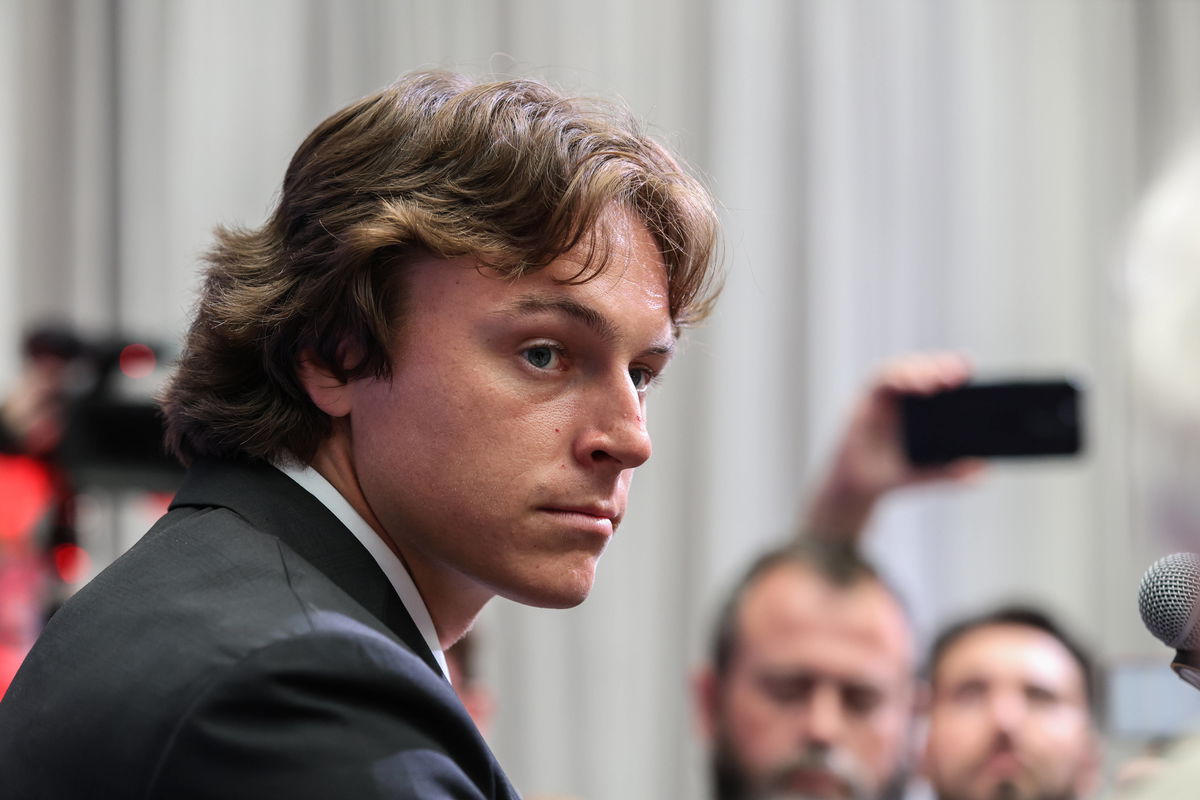
Imago
NCAA, College League, USA Football: SEC Media Day Jul 16, 2025 Atlanta, GA, USA Oklahoma Sooners quarterback John Mateer answers questions from the media during the SEC Media Days at Omni Atlanta Hotel. Atlanta Omni Atlanta Hotel GA USA, EDITORIAL USE ONLY PUBLICATIONxINxGERxSUIxAUTxONLY Copyright: xJordanxGodfreex 20250716_szo_th5_0158

Imago
NCAA, College League, USA Football: SEC Media Day Jul 16, 2025 Atlanta, GA, USA Oklahoma Sooners quarterback John Mateer answers questions from the media during the SEC Media Days at Omni Atlanta Hotel. Atlanta Omni Atlanta Hotel GA USA, EDITORIAL USE ONLY PUBLICATIONxINxGERxSUIxAUTxONLY Copyright: xJordanxGodfreex 20250716_szo_th5_0158
John Mateer’s offseason with the Sooners got a jolt when screenshots of Venmo transactions from his days at Washington State went viral. Officials labeled these transactions as “sports gambling” and directed them toward a high-profile game between UCLA and USC. However, Mateer denied the allegations, calling the transactions “inside jokes.” Since investigators found no real proof linking Mateer to gambling, they ended the investigation. But recently, the NCAA carved out strict rules that can completely change the sports betting scenario.
Watch What’s Trending Now!
“CSC launches its anonymous tip line, which we wrote about back in June,” On3 Sports’ Ross Dellenger posts on X. “It’s not a huge deal and has been very much expected – the NCAA has had a tip line for years.” This tip line lets folks anonymously report shady dealings. This came out on Wednesday as part of their plan to keep a closer watch on the flood of NIL deals in college sports after the $2.8 billion House settlement changed everything. Now, with tech provider RealResponse on board, reports can roll in via text, WhatsApp, or web forms.
ADVERTISEMENT
CSC launches its anonymous tip line, which we wrote about back in June. It’s not a huge deal and has been very much expected – the NCAA has had a tip line for years. https://t.co/l6XSX7BU7t
— Ross Dellenger (@RossDellenger) October 8, 2025
This’ll help the whistleblowers to stay under the radar while still holding everyone accountable. The CSC’s CEO, Bryan Seeley, made his stance pretty clear, saying, “One of the foundational aspects of any compliance program is reporting methods,” Seeley said. “And it’s important to have reporting methods that people feel comfortable using, which often involves providing anonymous reporting.” But it was not a fortnight decision; the commission had been weighing on the need for such a system for a long time. Plus, their partner, RealResponse, has been an experienced party in this game for a long time.
ADVERTISEMENT
The company teams up with the U.S. Anti-Doping Agency, the NFL Players Association, Major League Baseball, and other sports groups. The addition of CFB makes it really difficult to explore loopholes because coaches have long shied away from ratting out rivals, fearing backlash. But now they can do it without any sort of fear. “Since NIL has become a reality, it has heightened the opportunity for bad behavior and cheating to occur in college athletics,” said David Chadwick, the founder and CEO of RealResponse. “Everyone agrees the rules need to be followed, there needs to be accountability and enforcement.” This platform offers a safe way to maintain integrity across the board.
The CSC currently reviews NIL deals worth $600 or more through the Deloitte-developed NIL Go app. As of last month, it had approved nearly 6,100 deals totaling $35.4 million. The system, however, sometimes faces criticism for slow processing and complicated procedures. Kansas State’s Julie Owen even called the NIL Go website “less than ideal.” But Seeley points out the pace is mostly good, especially tightening reviews where “pay for play” red flags pop up. Also, with this new initiative, the NCAA has loosened the betting strings a bit.
ADVERTISEMENT
“The NCAA has approved a rule allowing college athletes and staff to bet on professional sports,” On3 Sports posts on X. However, this rule still requires the approval of the three divisions of the NCAA. As per On3’s Pete Nakos, “D-II and D-III boards meet later this month; this could be in place by Nov. 1.”
ADVERTISEMENT
Betting on pro sports gets a green light
The NCAA is slowly creating the itch to loosen the strict rules over pro sports betting. The NCAA’s Division I Administrative Committee has voted to allow student-athletes and athletic department staff to legally bet on professional sports. But with one down, the proposal still needs a green light from the rest of the two divisions. For decades, student-athletes have been stuck with strict bans on all forms of sports betting.
The NCAA’s old-school approach to sports betting warned them that the process might harm the integrity of the sport. But the world is changing, and the body understands that. Illinois athletic director and committee chairman Josh Whitman said the vote was about balancing concerns over gambling risks with acknowledging that student-athletes deserve the same freedoms as their peers on campus. But let me tell you, this leniency is strictly prohibited in entering the college grounds.
ADVERTISEMENT
The NCAA also plans to keep tight controls on betting-related ads and sponsorships around NCAA championships. This means they want to protect college sports’ integrity first and foremost. By allowing betting on pro sports, they aim to keep gambling within regulated boundaries rather than pushing it underground. Because that’s where risks and corruption threats take charge.
ADVERTISEMENT
ADVERTISEMENT
ADVERTISEMENT
.png)
.png)
.png)



